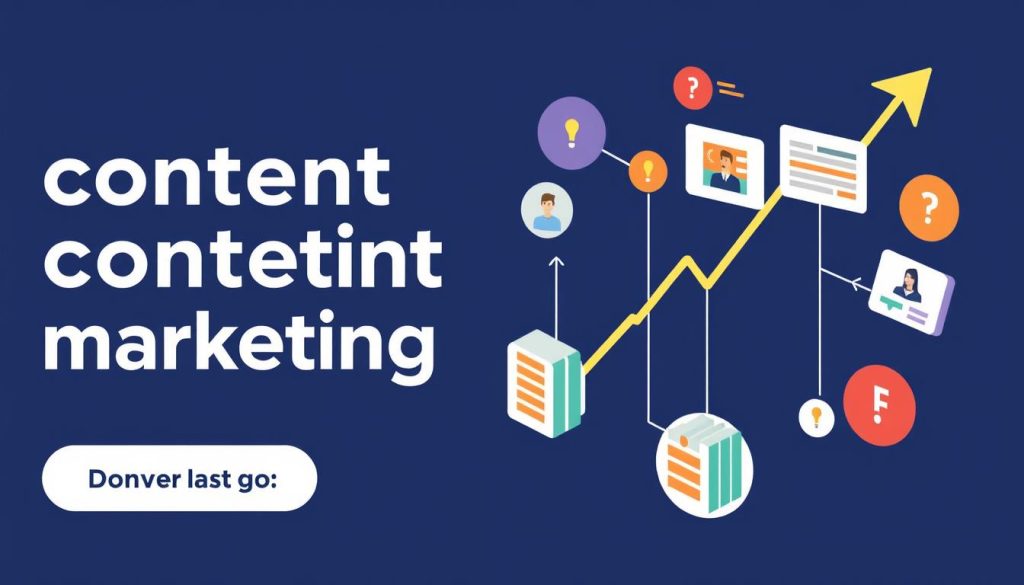In today’s digital landscape, effective content marketing is crucial for business growth. We transform complex marketing challenges into clear, actionable solutions that deliver measurable results.
Our approach cuts through the digital noise with strategic content that connects with your target audience at every stage of their journey. By leveraging a sophisticated ecosystem of formats and channels, we help businesses build authority and drive conversions.
By investing in quality content marketing, businesses can outperform competitors and achieve compounding returns over time. Our proven frameworks help ambitious business leaders establish thought leadership and generate qualified leads.
Key Takeaways
- Transform complex marketing challenges into clear, actionable content marketing solutions.
- Cut through digital noise with strategic content that connects with your target audience.
- Leverage a sophisticated ecosystem of formats and channels to build authority and drive conversions.
- Achieve compounding returns over time by investing in quality content marketing.
- Establish thought leadership and generate qualified leads with proven frameworks.
The Strategic Value of Content Marketing in Today’s Digital Landscape
As the digital landscape continues to evolve, businesses are recognizing the strategic value of content marketing in achieving their goals. The way companies connect with their audience has undergone a significant transformation, with content marketing playing a crucial role in this shift.
Defining Content Marketing and Its Business Impact
Content marketing is a strategic approach to connecting with customers by providing relevant, valuable, and consistent content. This method enables businesses to build relationships with their target audience while enhancing brand recognition and generating leads. By adopting a content marketing strategy, companies can create trust and authority with potential customers, ultimately leading to heightened brand visibility.
The impact of content marketing on business is multifaceted. It not only helps establish a brand’s presence online but also contributes to sustainable growth by building credibility in the market space.
How Content Marketing Has Transformed Digital Strategy
The rise of content marketing has revolutionized the way companies approach their marketing strategy. By shifting from traditional interruption-based marketing to invitation-based content marketing, businesses can now build direct relationships with their audience. This transformation has led to the creation of powerful synergies across channels and touchpoints, ultimately driving business success.
| Key Benefits | Description | Impact on Business |
|---|---|---|
| Establishes Authority | Builds trust with the target audience | Increased brand visibility |
| Drives Engagement | Creates meaningful relationships with customers | Improved customer acquisition costs |
| Enhances Credibility | Positions the brand as a thought leader | Sustainable business growth |
As noted by Joe Pulizzi, founder of the Content Marketing Institute, “Content marketing is a strategic marketing approach focused on creating and distributing valuable, relevant, and consistent content to attract and retain a clearly defined audience — and, ultimately, to drive profitable customer action.” This approach underscores the significance of content marketing in today’s digital landscape.

Why Content Marketing Online Drives Powerful Business Results

Effective content marketing online is crucial for businesses aiming to achieve sustainable growth. By creating and distributing valuable, relevant, and consistent content, businesses can attract and retain a clearly defined audience.
Building Trust and Authority with Your Target Audience
Content marketing online helps businesses build trust and authority with their target audience by providing them with valuable information that addresses their needs and pain points. This trust is foundational to establishing a loyal customer base. As a result, businesses can position themselves as thought leaders in their industry.
Generating Compounding Returns and Reducing Acquisition Costs
The compounding returns of content marketing create a significant competitive advantage. Each piece of content builds upon previous work, creating an asset portfolio that delivers increasing value over time. This approach not only reduces customer acquisition costs but also generates long-term returns. By leveraging content marketing, businesses can experience a snowball effect, where each additional piece of content yields higher returns.
Creating Evergreen Assets That Deliver Long-Term Value
Quality content continues to generate leads and sales months or even years after publication, unlike paid advertising that stops working the moment you stop paying. This evergreen nature of content marketing creates a sustainable marketing ecosystem that reduces dependency on constant content creation. By focusing on long-term value, businesses can maximize their ROI and achieve sustainable growth.
By understanding the benefits of content marketing online, businesses can harness its power to drive powerful results. Whether it’s building trust, generating compounding returns, or creating evergreen assets, content marketing is a critical component of a successful business strategy.
Developing a Comprehensive Content Marketing Online Strategy
Developing a comprehensive content marketing strategy is essential for driving meaningful business results. Many content marketing efforts fail because they lack a solid plan to attract the right prospects and nurture them through the buyer journey.

Identifying Your Ideal Customer Profile and Pain Points
We start every content marketing strategy by developing a crystal-clear understanding of your ideal customer profile—their challenges, aspirations, and decision-making processes. This involves identifying the pain points that trigger your customers’ search for solutions and creating content that addresses these specific triggers. By doing so, you can attract the right customer and avoid low conversion rates or converting customers who are a poor fit for your product or service.
Mapping Content to the Customer Journey
Our comprehensive approach maps specific content types to each stage of the customer journey—from awareness to consideration to decision. This ensures that your content marketing efforts effectively move prospects through your sales funnel. By aligning your content with the customer journey, you can create a seamless and engaging experience that drives conversions.
Establishing Measurable Goals and Success Metrics
Establishing measurable goals and success metrics from the outset ensures your content marketing strategy delivers tangible business results rather than vanity metrics. The most effective content strategies balance short-term conversion goals with long-term brand building objectives. By setting clear goals and metrics, you can measure the success of your content marketing efforts and make data-driven decisions to optimize your strategy.
To maximize the efficiency of your content marketing, we demonstrate how to create content pillars that support multiple pieces of related content, maintaining strategic focus while reducing waste. Your content marketing strategy must align with your broader business objectives to drive meaningful growth rather than simply generating engagement.
High-Performing Content Formats That Engage and Convert
In today’s digital landscape, high-performing content formats are crucial for capturing audience attention and driving results. A successful content marketing strategy involves leveraging multiple formats to engage your audience at every stage of their buying journey.
Long-Form Content: Blog Posts, White Papers, and Case Studies
Long-form content, including blog posts, white papers, and case studies, is essential for establishing your brand’s expertise and capturing valuable search traffic. These formats provide in-depth information that addresses the complex needs of your audience, fostering trust and authority.
- Blog posts help improve search engine rankings for targeted keywords.
- White papers offer detailed insights into industry topics, showcasing thought leadership.
- Case studies demonstrate the success of your products or services through real-world examples.

Video Marketing: Creating Compelling Visual Stories
Video marketing has become increasingly popular due to its ability to create immediate connections with audiences through visual storytelling. By leveraging video content, businesses can humanize their brand and explain complex concepts with clarity.
- Video content can be easily created using smartphones, reducing production costs.
- Visual storytelling enhances audience engagement and retention.
Podcasts and Audio Content: Building Intimate Audience Relationships
Podcasts and audio content offer a unique opportunity to build intimate relationships with your audience by directly engaging with them through their preferred medium. This format allows for extended periods of connection, fostering a deeper understanding of your brand.
- Podcasts provide a personal and engaging way to share industry insights.
- Audio content can be consumed on-the-go, making it a convenient option for audiences.
Email Marketing: Nurturing Leads Through Personalized Content
Email marketing remains one of the highest-ROI channels for nurturing leads through personalized content sequences. By tailoring your content to individual preferences, you can guide leads toward conversion more effectively.
- Email marketing allows for targeted and personalized communication.
- Personalized content sequences enhance lead nurturing and conversion rates.
By integrating these high-performing content formats into your content marketing strategy, you can create a cohesive and engaging experience that resonates with your audience and drives business results.
Building an Effective Content Marketing Funnel
Effective content marketing funnels are designed to educate, engage, and convert prospects into loyal customers. We design content marketing funnels that guide prospects through a strategic journey from initial awareness to confident purchase decisions.
Top-of-Funnel: Creating Awareness and Addressing Pain Points
At the top of the funnel, our focus is on creating awareness and addressing common pain points. Top-of-funnel content casts a wider net, attracting prospects who may not yet recognize they need your specific solution. This stage is crucial for building a strong foundation for the rest of the funnel.
Middle-of-Funnel: Educating and Building Consideration
As prospects move into the middle of the funnel, our approach shifts to educating and building consideration. We focus on providing valuable information that positions your solution as the logical answer to their challenges, avoiding heavy-handed sales tactics. This stage is about nurturing leads and establishing your brand as a trusted authority.
Bottom-of-Funnel: Facilitating Decision-Making and Conversion
At the bottom of the funnel, the goal is to facilitate decision-making and drive conversion. We achieve this through comparison guides, case studies, and specific implementation details that overcome final objections. By providing the necessary information, we empower prospects to make informed decisions and become customers.
To illustrate the effectiveness of a well-structured content marketing funnel, consider the following table:
| Funnel Stage | Content Type | Primary Goal |
|---|---|---|
| Top-of-Funnel | Blog Posts, Social Media | Awareness, Pain Point Identification |
| Middle-of-Funnel | E-books, Webinars | Education, Consideration |
| Bottom-of-Funnel | Case Studies, Comparison Guides | Decision-Making, Conversion |
By understanding the different stages of the content marketing funnel and creating targeted content for each stage, businesses can effectively guide prospects through their buying journey and drive conversions. Our funnel-based approach ensures every piece of content serves a specific strategic purpose, maximizing the return on your content marketing investment.
Content Creation Excellence: From Ideation to Publication
Elevating your content marketing strategy requires a focus on content creation excellence from ideation to publication. To achieve this, we transform content creation from a chaotic, reactive process into a strategic system that consistently produces high-value assets.
Generating Unique Content Ideas That Stand Out
Generating truly unique content ideas requires looking beyond competitor research to identify gaps and opportunities that others have missed. Our approach to content ideation balances audience needs, business objectives, and search opportunity to create content that serves multiple strategic purposes.
Developing a Consistent Editorial Calendar and Workflow
Developing a consistent editorial calendar and workflow is crucial for maintaining publishing momentum without sacrificing quality. By establishing clear workflows with defined roles and responsibilities, we ensure that content moves efficiently from concept to publication without bottlenecks.
Balancing Thought Leadership with SEO Best Practices
The balance between thought leadership and SEO best practices is critical—we create content that both algorithms and humans find valuable. Our content creation process incorporates strategic distribution planning from the beginning, ensuring each piece reaches its intended audience.
By implementing these strategies, we can build systems that scale your content creation capabilities without requiring proportional increases in resources. This approach enables you to publish high-quality content consistently, publish consistently, and publish for a long time, ultimately making your content marketing strategy highly effective.

Strategic Content Distribution and Promotion
To maximize the impact of your content marketing, you need a strategic distribution plan that reaches your target audience. Effective distribution ensures that your content doesn’t just exist; it resonates with your audience and drives meaningful engagement.
We understand that creating high-quality content is just the first step. The real challenge lies in getting it in front of the right people, at the right time, on the channels they use most. This is where a thoughtful multichannel distribution strategy comes into play.
Multichannel Distribution for Maximum Reach
Multichannel distribution isn’t about being everywhere; it’s about being in the right places with the right message. We help you identify the channels where your target audience spends their time, whether it’s social media, email, or other platforms.
- We maximize the impact of your content through strategic distribution across the channels where your target audience actually spends their time.
- Our approach to social media promotion goes beyond simply sharing links to create platform-native experiences that drive engagement and shares.
- We’ll show you how to leverage both owned, earned, and paid media channels to amplify your content’s reach without relying solely on algorithm-dependent organic distribution.

Content Repurposing: Getting More Value from Every Asset
Content repurposing is a strategic multiplier that extracts maximum value from every asset you create. By transforming one piece of content into many, you can significantly extend its lifespan and reach.
- Our systematic approach to content repurposing maintains message consistency while adapting format and depth to suit different platforms and audience segments.
- We’ll demonstrate how to transform long-form content into multiple derivative assets, including social snippets, email sequences, and visual content.
By integrating content repurposing into your content marketing strategy, you can ensure that every asset you create works harder for your business, driving more value and supporting your overall marketing goals.
Measuring and Optimizing Your Content Marketing ROI
Measuring content marketing ROI is the key to unlocking its full potential. To maximize ROI, it’s essential to track the right metrics and use the appropriate tools.
Essential Metrics for Content Performance Analysis
To ensure your content marketing strategy is on track, focus on metrics that matter. These include lead quality, brand awareness, website traffic, and customer retention. By monitoring these metrics, you can identify areas for improvement and optimize your content for better performance.
Key metrics to track: lead generation, conversion rates, customer acquisition costs, and social media engagement.
Tools and Platforms for Content Analytics
To measure content performance effectively, you need the right tools. Google Analytics is a popular choice, but third-party tools like SEMrush and Ahrefs can provide additional insights. When selecting a tool, consider your specific needs and the type of data you want to analyze.

By leveraging these tools and focusing on the right metrics, you can optimize your content marketing strategy and achieve a higher ROI.
Upskilling Your Team with Content Marketing Education
To stay ahead in the competitive market, investing in content marketing education for your team is no longer optional. As the digital landscape continues to evolve, the demand for skilled content marketers who can develop and implement effective strategies is on the rise.

Top Content Marketing Courses and Certifications
Several reputable courses can help upskill your team. Some of the best include:
- Content Marketing Course by HubSpot Academy
- Superpath Pro: A comprehensive program for content marketers
- Ahrefs’ Blogging for Business: Focuses on SEO-driven content strategies
- Content Marketing Certification Course by American Marketing Association
- CXL: Offers advanced training in content marketing and conversion optimization
Building Essential Content Marketing Skills In-House
While external courses are valuable, building essential content marketing skills in-house is equally important. This involves creating an environment where team members can share knowledge, learn from each other, and apply their skills practically.
By focusing on strategic upskilling, you can ensure that your team not only executes content marketing tactics effectively but also drives innovation in your content approach.
Overcoming Common Content Marketing Challenges
Navigating the complexities of content marketing requires a deep understanding of the common challenges that businesses face. As the digital landscape continues to evolve, companies must adapt their content strategies to stay ahead of the competition.

Maintaining Consistency and Quality at Scale
One of the primary challenges in content marketing is maintaining consistency and quality, especially when scaling content production. To achieve this, businesses need to implement systems and processes that standardize workflows without stifling creativity. By doing so, companies can ensure that their content remains engaging and relevant to their target audience.
Differentiating Your Brand in a Saturated Market
In a crowded market, differentiating your brand is crucial to standing out from the competition. Our approach focuses on developing and amplifying your unique perspective, rather than following industry trends. By addressing underserved audience segments and tackling topics from fresh angles, you can cut through market saturation and establish your brand as a thought leader. As we emphasize on our content marketing services, a distinctive brand voice is key to resonating with your audience.
Adapting to Algorithm Changes and Platform Evolution
The ever-changing landscape of search engine algorithms and social media platforms poses another significant challenge. To overcome this, businesses must build flexible content foundations that can pivot quickly without starting from scratch. By balancing platform-specific optimization with platform-independent value, companies can create resilient content strategies that transcend algorithm updates. As “With the rise of AI writers flooding social platforms with ‘me-too’ content, thought leadership content with a unique and contrarian viewpoint will continue to stand out”, it’s essential to focus on creating high-quality, unique content.
Conclusion: Transforming Marketing Challenges into Content-Driven Success
Transforming marketing challenges into opportunities is at the heart of content marketing’s power. We’ve mapped the complete landscape of content marketing online, from strategic foundations to measurement and optimization. Effective content marketing drives business success by creating deeper audience connections and sustainable growth. With the right strategies, businesses can achieve significant results.
